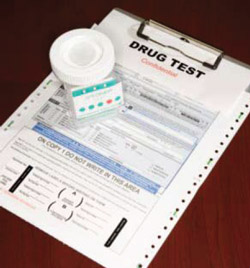Some big players in California's medical marijuana community are behind a new initiative that would create a uniform statewide system of regulations for legal production and sales.
If the cops want to attach a GPS device to your car and track your movements, they need to get a warrant, the Supreme Court ruled unanimously Monday.
Guatemala's new president vowed an "iron fist" against the drug cartels and called out the army to fight them, but now he wants to talk decriminalization.
Ciudad Juarez continues to be a hot spot, with five police officers killed there already this year. But it's not alone.
Medical marijuana is an active issue around the country, and especially so these days in California. Here's the latest.
Arizona Gov. Jan Brewer's battle to block dispensaries from opening in the state is just about at the end of the road. After losing in state court, she announced she wouldn't appeal.
The California Supreme Court has agreed to hear four medical marijuana dispensary cases. It's eventual decisions could bring some clarity to the murky realm of what is and is not legal in the state.
A bill that would subject welfare recipients to drug abuse assessments and possible drug testing if probable cause is found has passed a committee vote in the Virginia House of Delegates.
For the fourth year in a row, a hemp production bill has been filed in Kentucky.
Another person has died by eating drugs to try to avoid arrest. This time it happened in Las Vegas.
Lead us not into temptation with seized cash, nearby evidence rooms, and the perks of police powers, amen. A few law enforcement officers haven't heard the prayer.
Events and quotes of note from this week's drug policy events of years past.
A broad coalition of California advocates has filed a statewide medical marijuana regulation initiative aimed at ending the years-long confusion over what is and what is not allowed under state law by explicitly allowing sales and legalizing dispensaries statewide absent affirmative local popular votes to ban them. Pending approval of the measure's title and summary by state officials, the campaign is planning to roll out a signature-gathering and fundraising campaign early next month in a bid to put it before the voters in November.
The Medical Marijuana Regulation, Control, and Taxation Act (
MMRCTA) would create a state agency, the Bureau of Medical Marijuana Enforcement (
BMME), to regulate medical marijuana cultivation and distribution. The bureau's 21-person governing body would include a mix of patients, patient advocates, industry representatives, union representatives, law enforcement, and other stakeholders appointed by the governor or lieutenant governor.
The
BMME would be funded by a 2.5% tax on the sale of medical marijuana. Surplus tax revenues would fund emergency medical services, low-income assistance and health services, scientific and educational grant programs, and research into environmentally-sound cultivation practices.
The initiative would require state registration after July 1, 2013 for anyone cultivating, processing, manufacturing, transporting, distributing, or selling medical marijuana for use by others. Patients and caregivers who are growing at home for themselves would be exempt.
The
MMRCTA would make it more difficult -- but not impossible -- for cities and counties to ban dispensaries by declaring that "each city and county shall permit" medical marijuana facilities sufficient to meet local needs, which the initiative defines as at least one dispensary for each 50,000 residents in a county or town of 50,000.
Already existing bans and moratoria, of which there are nearly 200 statewide and growing weekly, would be allowed to continue to exist, but only for a specified period of time. Then they and new proposed local bans could only be enacted through a direct vote via local initiative. Cities would be allowed to maintain reasonable local control over zoning and other regulation of medical marijuana businesses.
The initiative would also outlaw the issuance or use of fraudulent physicians' recommendations. That means it would become an offense to issue a recommendation if the issuer is not a physician.
The measure has some of the biggest players in Golden State medical marijuana politics behind it. Its official proponents are Don Duncan, state director for
Americans for Safe Access, the country's leading medical marijuana advocacy group, and Ron Lind, president of the
United Food and Commercial Workers Local 5, which represents unionized dispensary workers around the state.
Also backing the initiative campaign, called
Californians to Regulate Medical Marijuana, are
California NORML, the
Coalition for Cannabis Policy Reform, the Sacramento-based
California Cannabis Association, and the Emerald Growers' Association. The effort is also endorsed by the national reform groups the
Drug Policy Alliance and the
Marijuana Policy Project.
But time is tight. The campaign has only until April 20 to gather the more than 500,000 valid signatures it needs to qualify for the ballot, and says it is trying to raise one million dollars by February 9. That will be just the beginning if the initiative is to have a chance to make the ballot.
"To come up with 500,000 valid signatures by April 20 is probably a $2 million proposition," said long-time California
NORML head Dale
Gieringer, who is also an
MMRCTA campaign committee member. "We're a little bit late out of the gate, and we still have to wait for the title and summary to come back, but we have some startup pledges already on hand, so we'll be ready to start circulating petitions early in February."
Even campaign communications consultant Roger Salazar's lower estimate was daunting. "It'll take between one and two million, but with this short time frame, we need these resources on hand," he said. "We need to come up with more like 800-850,000 signatures to be safe; we're looking at around 130% of what is required."
To attract the game-changing big bucks of donors like Peter Lewis or George Soros, who could propel the campaign to success with cash injections, the campaign is going to have to convince them it is worthy. Citing
campaign polling,
Gieringer thinks they have a shot.
"Regulating medical marijuana is
the marijuana issue in California," he said. "Support for the medical marijuana law here polls over 70% and support for uniform state-wide rules polls even higher. So, yes, we're approaching the usual suspects, as well as a couple of others. We know they want to make sure this is a good place to put drug reform money, and we think we'll come out well in comparison with other reform initiatives around the country."
The initiative came together out of widespread frustration with the status quo, said both
Gieringer and Salazar. Between heightened federal enforcement and increased local clampdowns, the medical marijuana distribution network is fraying, fraught with anxiety and uncertainty, leaving patients in some areas miles from their medicine and providers even in medical marijuana-friendly locales closing up shop.
"We've seen a lack of state government action to fill in the blanks on Proposition 215 and we've seen the kind of response we've had from the federal government," said Salazar. "Some of the groups that were supporting marijuana legalization decided to try to figure out how to reinforce the voters authorizing use for medical reasons, as well as a way to provide some of the oversight people have been looking for."
"The federal crackdown is widely rationalized by the charge that California doesn't have a legally regulated distribution system," said
Gieringer. "The Obama administration said it wouldn't go after people who were in clear and unambiguous compliance with state law, but we don't have any clear and unambiguous state laws. Some say it's legal, some say it isn't," he explained. "We have to do this to protect ourselves from more federal oppression. We need this for patients, the industry, and law enforcement alike; we need to give them a clear idea of what they can and cannot do."
Given the size and diverse nature of California's medical marijuana and marijuana reform communities,
any initiative concerning cannabis is going to be contentious. The intense negative reaction to 2010's Proposition 19 in some sectors of the community is evidence of that, as is the inability of would-be
legalizers to settle on any one of the four underfunded legalization initiatives languishing in search of signatures this year.
The
MMRCTA is no exception, and early detractors have emerged. Medical marijuana activist and gadfly Mickey Martin, who was prosecuted by the feds himself over his Tainted, Inc. edibles, used his
Cannabis Warrior blog to vociferously object to the creation of a new state agency to regulate the industry, to the inclusion of union representation on that agency's governing board, as well as his presentiment that the board will be stacked with industry insiders, among other things.
"There is strong support for uniform state regulation,"
Gieringer replied, "but also for local control. If people really don't want dispensaries, they could vote them down, but legal dispensaries are the default. Once this initiative passes, all of the ambiguity about what will be legal will be gone."
As for the make-up of the board, "We made sure the bureau had knowledgeable people, and why shouldn't labor have a place at the table?,"
Gieringer retorted. "Labor is a key supporter of the initiative," he said."The
UFCW is one of the key sponsors. They've been doing a hell of a lot to organize for this initiative and for legal marijuana in general. They've earned their seat at the table," he said.
There will doubtless be plenty more discussion of the merits and deficits of the
MMRCTA in the few weeks culminating in the April 20 signature gathering deadline, but this looks like a serious effort being run by some serious players in California. The question becomes just how serious the big money funders think it is, and what they think its chances of success are.
back to top
The US Supreme Court ruled unanimously Monday that police must obtain a search warrant before using a GPS device to track criminal suspects. But the decision was narrow, leaving unanswered lingering questions about citizens' expectations of privacy in an age of rapid technological advance.
The ruling came in
US v. Jones, in which Washington, DC, nightclub owner Antoine Jones was convicted of drug trafficking offenses based in part on evidence developed after police placed a GPS device on his vehicle and monitored his movements for 28 days. (See the Chronicle's earlier coverage of the Antoine Jones case
here.) Police had sought a warrant to place a GPS tracking device, but that warrant expired before the device was actually placed on Jones' vehicle.
Writing the majority opinion, Justice
Antonin Scalia said police needed a search warrant before attaching a GPS device to a suspect's vehicle. He was joined in the opinion by Chief Justice John G. Roberts
Jr. and Justices Anthony M. Kennedy, Clarence Thomas and Sonia
Sotomayor.
"We hold that the government's installation of a GPS device on a target's vehicle, and its use of that device to monitor the vehicle's movements, constitutes a 'search'" under the Fourth Amendment's protection against unreasonable searches and seizures, Scalia wrote.
But the court split on whether the decision went far enough. Scalia wrote that if the government had been able to use electronic surveillance to spy on Jones without physically trespassing on his property, that may have been "an unconstitutional invasion of privacy." But, Scalia added, "The present case does not require us to answer that question."
That wasn't good enough for Justice Samuel
Alito Jr., who, in a concurring opinion, said the court should have tackled the larger question instead of using "18
th century tort law" to decide a case about "21
st century surveillance techniques."
"The court's reasoning largely disregards what is really important (the
use of a GPS for the purpose of long-term tracking) and instead attaches great significance to something that most would view as relatively minor (attaching to the bottom of a car a small, light object that does not interfere in any way with the car's operation),"
Alito wrote.
It was the long-term surveillance itself, not the fact that police physically placed a tracking device on Jones' vehicle, that violated the Fourth Amendment's proscription against warrantless searches and seizures,
Alito argued.
"The use of longer term GPS monitoring in investigations of most offenses impinges on expectations of privacy," he wrote. "For such offenses, society's expectation has been that law enforcement agents and others would not -- and indeed, in the main, simply could not -- secretly monitor and catalog every single movement of an individual's car for a very long period."
Although Justice
Sotomayor joined the majority opinion, she also seemed disappointed that the court had not ruled more broadly. She wrote that the court had in effect ducked the big question of whether warrantless electronic surveillance was constitutional and warned that Monday's decision will do little to answer that question.
"With increasing regularity, the government will be capable of duplicating the monitoring undertaken in this case by enlisting factory- or owner-installed vehicle tracking devices or GPS-enabled smart phones,"
Sotomayor wrote. "In cases of electronic or other novel modes of surveillance that do not depend upon a physical invasion on property, the majority opinion's
trespassory test may provide little guidance."
Still, this is a win for the Fourth Amendment and for individual privacy rights, even if it is limited.
back to top
Newly installed Guatemalan President Otto Perez Molina has called for talks about a regional drug strategy, including drug decriminalization. Perez Molina made the remarks in an interview with the Mexican TV network Televisa, Miami's El Nuevo Herald reported.

Otto Perez Molina and the "iron fist" (wikimedia.org)
"I believe that the decriminalization of drugs would have to be a strategy in which all the region agreed," said the retired army general who took office January 14. "We're talking here from the south, where it is produced, through all the countries, like Guatemala, through which it passes, to Mexico and the United States. I think that if this is not the path, then when have to find another, but it has to be a regional strategy in which we are all disposed to make the same effort."
While praising Mexican President Felipe Calderon for making "a very great effort" in his fight against drug traffickers, Perez Molina complained that that effort "has not been matched by the United States, which is its neighbor and largest [drug] market."
Perez Molina's remarks on decriminalization come as something of a surprise. He said nothing like that during his election campaign, in which he vowed to use "an iron fist" against encroaching Mexican cartels. In one of his first acts in office,
he emulated Calderon by calling out the armed forces to fight the cartels.
Both the
Zetas and the
Sinaloa cartel are reported to be operating in Guatemala, which borders Mexico to the north. The drug gangs are blamed for an increasing number of killings in the Central American country, the bloodiest being
the May 2011 massacre of 27 farm workers whose boss had been targeted by the
Zetas.
back to top
by Bernd Debusmann Jr.
Mexican drug trafficking organizations make billions each year smuggling drugs into the United States, profiting enormously from the prohibitionist drug policies of the US government. Since Mexican president Felipe Calderon took office in December 2006 and called the armed forces into the fight against the so-called cartels, prohibition-related violence has killed more than 50,000 people, including more than 15,000 in 2010 and another 15,000 last year. The increasing
militarization of the drug war and the arrests or killings of dozens of high-profile drug traffickers have failed to stem the flow of drugs -- or the violence -- whatsoever. The
Merida initiative, which provides $1.4 billion over three years for the US to assist the Mexican government with training, equipment and intelligence, has so far failed to make a difference. Here are a few of the latest developments in Mexico's drug war:
Friday, January 20
In Durango,
a high-ranking aide to Sinaloa Cartel leader Joaquin "El Chapo" Guzman was shot and killed by an army special operations unit. Luis Alberto Cabrera
Sarabia, "the Engineer," is thought to have been responsible for cartel operations in Durango and parts of Chihuahua. One gunman was killed in the operation and eleven were taken into custody. Four soldiers were wounded during the gun battle.
Saturday, January 21
In
Ciudad Juarez,
a police officer was shot and killed on his way to work. A police spokesman said the officers were in a private vehicle when they were cut off by another car and several men opened fire.
In Sonora,
a high-ranking Sinaloa Cartel figure was captured near the city of
Cananea. Fidel
Mancinas Franco is thought to have been in charge of cartel operations in
Nogales, Agua
Prieta,
Naco and
Cananea. He is also wanted in the United States in connection with the deaths of 11 migrants in 2009.
Sunday, January 22
In
Atoyac de
Alvarrez, Guerrero,
eight men were killed at a funeral for a man shot days earlier. The men were attacked by men wielding automatic weapons.
In Acapulco, three bodies were found in an empty lot. Another individual was found decapitated in a car and a fifth died during an exchange of fire with the police.
Monday, January 23
In Veracruz,
Mexican marines took over the duties of the local transit police. The move is designed to root out corrupt elements of the force, which, like the Veracruz municipal police, is thought to have been thoroughly infiltrated by organized crime groups.
In Ciudad Juarez,
at least eight people were murdered. In one incident, four men were shot and killed when gunmen stormed a house in the south of the city. Earlier in the day, a naked body bound in duct tape was thrown from a moving car, along with a note from a criminal group.
In Saltillo, Coahuila,
four gunmen were killed by the army. A local university was temporarily locked down during the incident.
Also in Saltillo,
army and police forces conducted operations inside several penal facilities looking for drugs, weapons and other suspicious items.
Tuesday, January 24
Near Mexico City,
five police officers were ambushed and killed as they made a traffic stop in Ixtapaluca. The officers had stopped a vehicle when a taxi and a minivan pulled up and they were shot at by gunmen with assault rifles. Police suspect the incident was an attempt to free people who had been taken into police custody.
Across Ciudad Juarez,
banners threatening the municipal police were hung at various locations. Some of the notes also mention police Chief Julian Leyzoala by name. The banners were taken down and police stations in the city were put on high alert.
Two officers were
shot and killed as they traveled in a private Ford Mustang in the city. At least five municipal police officers have been killed so far in 2012.
[
Editor's Note: We are no longer going to keep a running tally of the death toll; the figures are too unreliable. The latest figures below were released by the Mexican government in January.]
Total Body Count for 2007 (approx.): 4,300
Total Body Count for 2008 (approx.): 5,400
Total Body Count for 2009 (approx.): 9,600
Total Body Count for 2010 (official): 15,273
Partial Body Count for 2011 (official): 12,093*
Total Body Count (official): 47,705*
* Official figures through September 30, 2011. Unofficial estimates put the entire year's death toll at around 16,000, meaning more than 50,000 people have been killed by the end of 2011.
back to top
Medical marijuana is an active issue around the country, and especially so these days in California. Here's the latest:
Arizona
Last Friday,
Gov. Jan Brewer gave up her fight against medical marijuana dispensaries in the state. Her decision came after having her challenges thrown out in both federal and state court. Last Friday, she directed state officials to begin implementing the law to allow dispensaries to apply to operate.
California
The clock is ticking on
Senate Bill 129, introduced by Sen. Mark Leno (D-San Francisco). The bill would provide medical marijuana patients with protection from workplace discrimination. The legislature must act on the bill by month's end or it dies. It's the same story with
Assembly Bill 1017, introduced by Rep. Tom
Ammiano (D-San Francisco), which would allow for reduced misdemeanor charges in cultivation cases.
Last Tuesday,
the Colusa City Council voted unanimously to extend its ban on dispensaries to another full year. The ordinance goes into effect immediately. This is the last extension on the temporary ban; after this, the city will need a permanent ordinance to spell out the restrictions.
Last Wednesday,
federal agents raided the Disabled American Veterans Collective in Murrieta. The owner, Kevin Freeman of Temecula, and one other person were arrested on suspicion of possession of marijuana for sale. Federal search warrant documents accused Freeman of operating a for-profit business that would sell marijuana to people without medical conditions. But Freeman said his operation was "a true collective." The dispensary had previously seen customers pulled over by deputies after leaving the premises and been the subject of an undercover buy by a deputy who fraudulently obtained a medical marijuana recommendation.
Also last Wednesday,
the US Attorney for Southern California announced that federal prosecutors over the past week have filed four asset forfeiture lawsuits against properties housing marijuana storefronts in Los Angeles and Orange counties and have sent warning letters to property owners and operators of "illegal marijuana stores" in several Southland cities. They also sent threat letters to dispensary operators and property owners of the nearly two dozen dispensaries operating in Costa Mesa. The feds also raided three Costa Mesa dispensaries.
Also last Wednesday,
Glenn County supervisors moved ahead with an ordinance that would ban dispensaries, collectives, and co-ops, but would allow backyard grows for patients. The county's emergency moratorium ordinance expires in March.
Last Thursday,
the California Supreme Court decided to hear four medical marijuana cases in a bid to restore same clarity to the state's muddled medical marijuana laws. The cases revolve around state-federal and state-local conflicts, and mixed rulings in lower courts have led to massive confusion in the state.
Also last Thursday,
Californians to Regulate Medical Marijuana announced it had filed a medical marijuana regulation initiative with the state last month. The campaign expects to be okayed for signature-gathering early next month and has until April 20 to gather more than 500,000 valid signatures to make the November ballot. See our feature story on it
here.
Last Friday,
prosecutors in San Luis Obispo County announced they were dropping the charges against six people arrested in 2010 for running medical marijuana delivery services. Prosecutors threw in the towel after a judge issued jury instructions that allowed the defendants to argue that they thought an undercover officer who infiltrated them was part of their collective. That would make the case tough to win, prosecutors said.
Also last Friday,
a judge in Riverside rejected a restraining order sought by the city of Murrieta against a newly opened medical marijuana collective. The Greenhouse Cannabis Club can stay open pending a February 17 hearing, even though Murrieta has a moratorium on dispensaries, the judge ruled.
On Monday,
federal agents and Riverside County sheriff's deputies raided six suites containing medical marijuana operations in a business park north of Murrieta. The lawmen became aware of the operations while raiding a neighboring dispensary last week. Three people were arrested on marijuana cultivation charges. The raids were led by the DEA.
Also on Monday,
the Calexico Planning Commission approved a ban on dispensaries. The proposed ban will now go before the city council.
On Tuesday,
San Francisco announced it would begin issuing dispensary permits again after the state Supreme Court agreed to hear four medical marijuana cases that could clarify state law. In doing so, the high court vacated a case, Pack v. Long Beach, that said city or county laws regulating medical marijuana violated federal law. Now that Pack has been vacated, city officials said the permitting process can resume as normal.
The following day, the city changed its mind.
Also on Tuesday,
Mendocino County supervisors voted to kill the county's medical marijuana permit program after receiving threats of legal action from Northern California US Attorney Melinda Haag. The innovative program allowed collectives to grow up to 99 plants per parcel, with each plant tagged by the sheriff's office.
Also on Tuesday,
Humboldt County supervisors voted unanimously to extend a temporary moratorium on new medical marijuana dispensaries for an additional 10 months and 15 days. The supervisors also added language to the ordinance that is meant to protect existing dispensaries from closure. Three dispensaries currently operate in the county.
Also on Tuesday,
the Whittier city council voted to impose a 45-day moratorium on new dispensaries, citing the Pack v. Long Beach ruling and ignoring the fact that the state Supreme Court vacated it last week. That means the number of dispensaries in the city is capped at one -- the Whittier Hope Collective, which opened in July 2010 after the council approved a conditional use permit. Although the moratorium is only for a month and a half, the council indicated it intended to maintain the status quo until the Supreme Court decides Pack and other medical marijuana cases.
Lastly, on Tuesday,
a judge in Live Oak heard arguments in a civil lawsuit brought against the city over its ban on growing medical marijuana. James
Maral sued after the city council last month approved the ban on even personal grows, saying it would force him to make "cruel choices." The lawsuit accused the city of running afoul of state law (Proposition 215), which allows patients to grow their own medicine. The city had acted after complaints from residents about the "stench" of marijuana and fears of violent robbery attempts. The judge refused to issue a temporary injunction because he had not seen the ordinance, but left open the possibility of revisiting the decision at a later date.
Colorado
Last Thursday,
Colorado US Attorney John Walsh told the Denver Post that evidence medical marijuana is having a negative impact on kids spurred his decision to crack down on dispensaries near schools. The comments came days after he sent letters to 23 dispensaries within 1,000 feet of schools. The letters ordered the dispensaries to close by Feb. 27 or face potential criminal prosecution or seizure of assets.
On Monday,
Law Enforcement Against Prohibition sent a letter to Colorado US Attorney John Walsh saying his threats and actions against medical marijuana providers are "a disservice to the state of Colorado." The letter was signed by LEAP director Neill Franklin and two Colorado law enforcement figures, former municipal court Judge Leonard
Frieling and retired Denver police officer Tony Ryan.
On Wednesday, medical marijuana supporters organized by
Sensible Colorado did a mass phone-in to their US congressional representatives urging them to help call off the federal crackdown and support the state's medical marijuana program.
Indiana
Earlier this month,
state Rep. Tom Knollman (R) introduced a medical marijuana bill,
HB 1370, which calls upon the Indiana Department of Health to develop a regulatory framework for the growth and distribution of medical marijuana through dispensaries and to register patients with debilitating medical conditions. This is the first medical marijuana bill introduced in the state in recent memory.
Kansas
On Tuesday,
a medical marijuana bill got a hearing in the House Health and Human Services Committee. The bill, the
Kansas Compassion and Care Act, was introduced by Rep. Gail Finney (D-Wichita). Previous medical marijuana bills have been stalled in committee, and the committee took no action on this one Tuesday. Meanwhile, supporters of the bill packed the hearing room and demonstrated outside before the hearing.
Maryland
Maryland House Delegate Cheryl Glenn (D-Baltimore) has introduced a comprehensive medical marijuana bill that would replace a bill passed last year as a stop-gap measure while the state appointed a workgroup to further study the issue. House Bill 15,
the Maryland Medical Marijuana Act, would create clear rules for qualified patients and law enforcement, and put in place a strictly regulated production and distribution system. A measure passed last year created minimal protections for patients but did not set up a distribution system. That measure created a working group to come up with proposals for this year, but neither of those proposals includes allowing patients to grow their own. Glenn's bill does. It now awaits committee hearings.
Montana
Last Thursday,
the owner of the Big Sky Health Health dispensary in Missoula pleaded not guilty in federal court to a charge of conspiracy to manufacture and distribute marijuana. Jason Washington is one of six defendants in an indictment that followed federal raids last November on numerous businesses, homes and warehouses linked to marijuana businesses in western Montana. Washington is a former quarterback for the University of Montana Grizzlies, and the feds even seized his Big Sky championship ring, as well as 80 pounds of marijuana and $232,000 in cash.
Last Friday,
a federal judge ruled that Montana's medical marijuana law doesn't shield providers of the drug from federal prosecution. US District Judge Donald Molloy dismissed a civil lawsuit by 14 persons and businesses that were among those raided by federal authorities last year. He cited the Constitution's supremacy clause. "Whether the plaintiffs' conduct was legal under Montana law is of little significance here, since the alleged conduct clearly violates federal law," Molloy wrote. "We are all bound by federal law, like it or not."
New Jersey
Last Friday,
the New Jersey Supreme Court declined to hear the appeal of John Ray Wilson. Wilson, an MS patient, was sentenced to five years in prison for growing his own medicine in his back yard. He had been out on appeal, but now must resume serving his sentence. Wilson was not allowed to tell his jury why he was growing marijuana plants. Supporters, including legislative leaders, have campaigned for clemency for Wilson, to no avail.
Ohio
Last Friday,
Ohio Attorney General Mike DeWine certified a medical marijuana ballot issue, and on Monday, the Ohio ballot board gave its okay. The
Ohio Medical Cannabis Amendment campaign can now begin signature gathering. It needs some 385,000 valid voter signatures to make the November ballot. This is the second Ohio medical marijuana initiative to be certified for the 2012 campaign. The
Ohio Alternative Treatment Amendment was approved in October.
WashingtonOn Monday, the city of Bellingham revoked the registrations of medical marijuana dispensaries after deciding that dispensaries were not legal under state or federal law. The city has not yet decided what to do about dispensaries that are already operating there, but at least one said it would reopen as a private, members-only club next month.
Washington, DC
On Monday, a hydroponics superstore known as the "Walmart of Weed" announced it would open a store in the nation's capital in March. WeGrow sells all of the products and services one would need to grow marijuana or other indoor plants, but does not sell the plant itself. The company said it had signed a lease for a property on Rhode Island Avenue NE. The company already operates superstores in Oakland, Sacramento and Phoenix.
back to top
A state court judge in Phoenix last Thursday ordered Arizona Gov. Jan Brewer (R) to fully implement the state's Medical Marijuana Act, which was approved by the voters in 2010. Maricopa County Superior Court Judge Richard Gama said Brewer was acting illegally in refusing to implement the law.
[Update: Last Friday, Brewer said she would direct state employees to implement the law.]
Brewer had argued that she had the discretion to delay enactment of the dispensary regulating portions of the law while she sought clarity in federal court about whether state workers who would regulate the industry faced prosecution under federal laws.
Brewer's federal case was thrown out earlier this month and she gave up on that avenue two weeks ago, but that was irrelevant as far as Judge Gama was concerned because he didn't buy her argument in the first place.
"Defendants cite no authority for this proposition, and the court has found none," Gama wrote in his ruling. "The voters intended the Arizona Medical Marijuana Act be implemented within 120 days. This has not been done."
In that ruling, Gama also held that rules on who can and cannot have a dispensary permit imposed by Health Director Will Humble were illegal. There was nothing in the law to allow such restrictions, Gama said.
This is the end of the road for Brewer's opposition to the medical marijuana law. She campaigned against it in 2010, but voters approved it anyway. Then, even as the state processed some 18,000 patient registrations, Brewer blocked the implementation of the portion of the law allowing up to 125 state-regulated dispensaries.
Her effort in federal court went down in flames last month, and now the state court has ruled against her. She could have appealed the state court decision, but chose not to.
back to top
The California Supreme Court announced last Wednesday it will review four medical marijuana cases decided by lower courts. In taking on the cases, the high court will attempt to resolve issues of federal, state, and local control that have tied the state's elected officials and medical marijuana community in knots for the past few years.

To be or not to be? That is the question the court will decide. (wikimedia.org)
The court will review
Pack v. City of Long Beach, a case that began when a dispensary operator sued the city, saying the regulations it had crafted were too onerous. But instead of deciding whether the regulations were or were not too stringent, the appeals court threw out the regulations, saying that since marijuana is illegal under federal law, federal law preempted local officials from creating regulations for its sale.
Since the Pack decision, a number of California local governments have rescinded regulations they had crafted and instead opted to simply ban dispensaries from operating. Other localities have cited Pack as a reason not to move forward with plans to regulate dispensaries.
The court will also review
City of Riverside v. Inland Empire Patient's Health and Wellness Center, in which an appeals court ruled that cities and counties have the right to ban dispensaries. That ruling said neither Proposition 215 nor the state's medical marijuana program bars cities from banning the facilities.
As with Pack, local governments around the state have used the Riverside decision to move away from regulation and toward bans.
The court will also take up an unpublished ruling on a dispensary ban in Upland, which closely mirrors the legal reasoning in Riverside, and a case from Dana Point in which the issue of who has standing to challenge local dispensary regulations is at stake.
All four decisions have now been vacated pending the Supreme Court's decision, which is not expected for as long as two years. In the meantime, cities and counties can no longer rely on those decisions to argue they can't regulate dispensaries or that they can ban them.
The state Supreme Court is stepping into the fray even as federal law enforcement officials are in the midst of a renewed crackdown on medical marijuana providers across California. Federal lawsuits challenging that campaign have been filed in San Francisco and elsewhere.
The medical marijuana community welcomed the court's decision to take up the cases.
"These cases were very problematic for patients and their ability to safely and legally access a medication that works for them," said Joe
Elford, chief counsel for
Americans for Safe Access (
ASA), the country's leading medical marijuana advocacy group. "We're very pleased that local governments will now be unable to use appellate court decisions to deny patients access to medical marijuana in their own communities."
ASA was joined by the
American Civil Liberties Union, the
Drug Policy Alliance, and the County of Santa Cruz in filing
a brief last month asking the court to review the Pack case.
back to top
A bill that would subject some welfare recipients to drug testing passed the Republican-controlled House Health, Welfare & Institutions Committee on a 14-8 vote along party lines. Democrats protested to no avail.
Introduced by Delegate Christopher Head (R-Roanoke), the bill,
House Bill 221, would require local departments of social services to screen welfare applicants and recipients to determine whether probable cause exists to believe they are using illegal drugs. If probable cause is found, a formal substance abuse assessment, which could include drug testing, would be required. Persons who either refuse to take the drug test or fail it would be ineligible for welfare payments for one year, unless they underwent and complied with drug treatment.
"What are we trying to do here? asked
Lionell Spruill Sr. (D-Chesapeake). "Now we're picking on people who are poor," he complained in remarks reported by the
Richmond Times-Democrat.
Spruill asked whether others who receive largesse from the state, whether it is corporations with tax breaks or General Assembly members whose salaries are paid by taxpayers, should be tested as well.
"What about us?" he asked. "We make a big $17,600 a year -- why don't you test us?"
Supporters of the bill insisted their attention wasn't aimed at any particular group, but at keeping a close eye on the taxpayers' money.
"They're not being singled out," said Head. "As stewards of public money, we have a responsibility to make sure that that money's being spent right."
The Department of Planning and Budget has estimated that the bill would cost the state more than $1.5 million in the next fiscal year and about $1.2 million annually thereafter due to costs for staff, substance abuse screenings, assessments and drug testing. Welfare benefits would decrease by about $250,000 in the first year and about $500,000 thereafter.
Welfare or unemployment drug testing bills are on the agenda in other states as well. See our overview on the issue from last week
here.
back to top
A bill to allow farmers to register to grow industrial hemp in Kentucky was filed last Thursday. House Bill 286 has 12 cosponsors.

hemp field at sunrise (votehemp.com)
The bill would create a process through which farmers could apply to grow hemp and then be vetted by state officials. If applicants passed a background check, they would pay a fee to be registered to grow hemp.
Hemp production is prohibited under federal law (unless the DEA authorizes a permit, which it doesn't), and the bill acknowledges as much, saying "nothing in [this bill] shall be construed to authorize any person to violate any federal rules or regulations."
But bill supporters said passage of a hemp legalization bill would send a message to Washington that Kentucky is joining the list of states that want to grow hemp. Kentucky Agriculture Commissioner James Comer, a former House member, is among those supporters.
"This sends a message that this is something we're serious about here in Kentucky," Comer said.
According to the industry group
Vote Hemp, nine states have passed bills authorizing either hemp production or research into it, while eight states have passed resolutions calling for legal hemp production.
Kentucky passed a hemp research bill in 2001, and hemp production bills have been introduced there each year since 2009.
Hemp is produced in at least 30 countries, and can be legally imported to the US, but not grown here because the DEA refuses to make a distinction between industrial hemp and marijuana. Hemp is the only plant that can be imported, but not produced here.
The bill was filed Thursday by Rep. Richard Henderson (
D-Jeffersonville), with co-sponsors including former House Speaker Jody Richards (D-Bowling Green), David Osborne (R-Prospect) and Mary Lou
Marzian (D-Louisville).
The bill has been assigned to the Agriculture and Small Business Committee.
back to top
A man police identified as "a suspected drug dealer" died Wednesday night after ingesting a bag of cocaine as he was being detained by Las Vegas narcotics detectives. Anthony Barrett, 43, becomes the fifth person to die in US domestic drug law enforcement operations so far this year.
According to police, narcotics officers assisted by patrol officers learned Barrett was going to sell cocaine in his possession and pulled over his vehicle to investigate. As officers approached the vehicle, Barrett swallowed a bag believed to contain cocaine.
Police said officers on the scene summoned medical assistance as they took Barrett into custody. He was transported by ambulance to Sunrise Hospital and Medical Center, where he later died.
The Clark County coroner's office has not yet determined an official cause and manner of death. Detectives from the Las Vegas Metropolitan Police investigations team responded and opened an investigation, police said.
back to top
Lead us not into temptation with seized cash, nearby evidence rooms, and the perks of police powers, amen. A few law enforcement officers haven't been reciting the prayer. Let's get to it:
In Austin, Texas,
the state attorney general's office is reviewing the use of asset forfeiture funds by the Brooks County Sheriff. An audit of $562,000 in asset forfeiture spending by Sheriff
Balde Lozano found that he spent $394,000 to purchase 18 cars without county approval for reasons that had nothing to do with law enforcement and that he charged more than $88,000 in restaurant dinners, department and electronics store purchases, and at hotels and gas stations. He spent $3,000 at
Cavender's Boot City alone. Lozano has not yet been charged with any crime, but the investigation comes only eight months after former Brooks County DA Joe Frank Garza was sentenced to prison for skimming at least $1.2 million from the fund for himself and his former staff members.
In
Bridgeton, New Jersey
, a Williamstown police officer was arrested last Wednesday on steroid-peddling charges, including a count of intending to deal drugs near a local school. Officer Robert Smith, 31, went down after local police received information he was involved in narcotics. He is charged with possession of a controlled substance, possession of a controlled dangerous substance with the intent to distribute, and distribution of a controlled dangerous substance in a school zone. At last report, he was being held in the Salem County jail on $75,000 cash bail. He has been suspended without pay and faces dismissal if found guilty.
In Alexandria, Louisiana,
a former supervisor of the Rapides Parish drug task force was indicted last Thursday on a slew of drug and malfeasance charges. Michael
LaCourt had originally been arrested in Augusts, but a parish grand jury issued a superseding indictment charging him with distribution of methamphetamine and conspiracy to distribute meth. He is also charged with having sex multiple times with a woman who was under the supervision of the Division of Probation and Parole. He faces four malfeasance charges, three of them for his misbehavior with the woman and one for falsely telling
Crimestoppers that a certain person had provided information in a case, allowing that person to collect reward money. Bond was set at $150,000.
LaCour had headed Metro Narcotics from 2008 until his August 2011 arrest. He went down after "three female offenders" complained about him.
In Carlsbad, California,
a Carlsbad vice and narcotics detective was arrested last Thursday after he was caught stealing drugs from the evidence room "by various police employees."
Det. Michael Koch, 44, an 18-year veteran of the department, was arrested within hours of the incident and posted $25,000 bail last Friday. The department declined to comment on the type or quantity of drug is accused of taking.
In Tucson, Arizona,
a Border Patrol agent and an Arizona prison guard were arrested last Thursday on charges they had conspired to smuggle drugs into the US. Border Agent
Ivhan Herrera-Chiang and corrections officer Michael Lopez are charged with conspiracy to distribute methamphetamine, cocaine and marijuana. Herrera-Chiang had been part of the Border Patrol's Smuggling Interdiction Group since March 2011, but was actually acting as a middle man between Mexican drug traffickers and Lopez. He is accused of monitoring Border Patrol radio and agent locations and notifying Lopez where the smuggling effort should occur. Both men are reported to have made at least partial confessions.
In Savannah, Georgia,
a former Savannah-Chatham police officer pleaded guilty last Friday to extorting drugs and a cell phone while working off-duty at a night club while in uniform. Floyd Sawyer, 45, went down after DEA agents informed the FBI they had received reports that Sawyer and another Savannah police officer,
Sgt. Kevin Frazier, were shaking down dealers at the club and taking their drugs and other possessions. FBI agents set up a sting, sending an undercover agent into the club posing as a dealer. Sawyer and Frazier shook down the agent, taking
Oyxcontin pills and a cell phone from him. The pills ended up going to a local small-time dealer and the phone ended up with one of Sawyer's relatives. Sawyer pleaded guilty to extortion, but denied using force or intimidation, leaving the judge in the case to warn that he may not accept the plea bargain.
In Palm Beach, Florida,
the commander of the Palm Beach County Sheriff's Office SWAT team has been placed on administrative leave, the office announced Tuesday. Lt. Daniel Burrows, a 17-year-veteran of the department was placed on leave January 3 amid allegations of misuse of prescription pain medication and possibly being under the influence of drugs while on duty.
back to top
February 1, 1909: The International Opium Commission convenes in Shanghai. Heading the US delegation are Dr. Hamilton Wright and Episcopal Bishop Henry Brent, who both try to convince the international delegation of the immoral and evil effects of opium.
January 31, 1945: A New York Times article reports an increase in marijuana trafficking and mentions that an official at the Treasury Department says that traffic in some instances reaches "the proportion of well-financed national and international conspirators." One of the New York gangs which came under investigation was the "
107th Street Mob," formerly headed by the notorious mobster "Lucky"
Luciano.
January 28, 1972: The Nixon Administration creates the Office of Drug Abuse Law Enforcement (
ODALE) to establish joint federal/local task forces to fight the drug trade at the street level. Myles Ambrose is appointed director.
January 28, 1982: President Ronald Reagan creates a cabinet-level task force, the Vice-President's Task Force on South Florida. Headed by George Bush, it combines agents from DEA, Customs, ATF, IRS, Army, and Navy to mobilize against drug traffickers.
January 27, 1995: The international hashish seizure record is set -- 290,400 pounds -- in Khyber Agency, Pakistan.
January 30, 1997: New England Journal of Medicine editor Dr. Jerome
Kassirer opines in favor of doctors being allowed to prescribe marijuana for medical purposes, calling the threat of government sanctions "misguided, heavy-handed and inhumane."
January 29, 1998: Judge Nancy
Gertner, a district judge in Boston, criticizes the drug war for spending too much federal funds while depriving Americans of liberty at a forum organized by the Voluntary Committee of Lawyers.
January 26, 2000: Rockefeller drug law prisoner Elaine Bartlett, subject of the book "Life on the Outside: the Prison Odyssey of Elaine Bartlett," is set free after sixteen years in Bedford Hill prison for a first time, low-level, cocaine selling offense.
back to top










